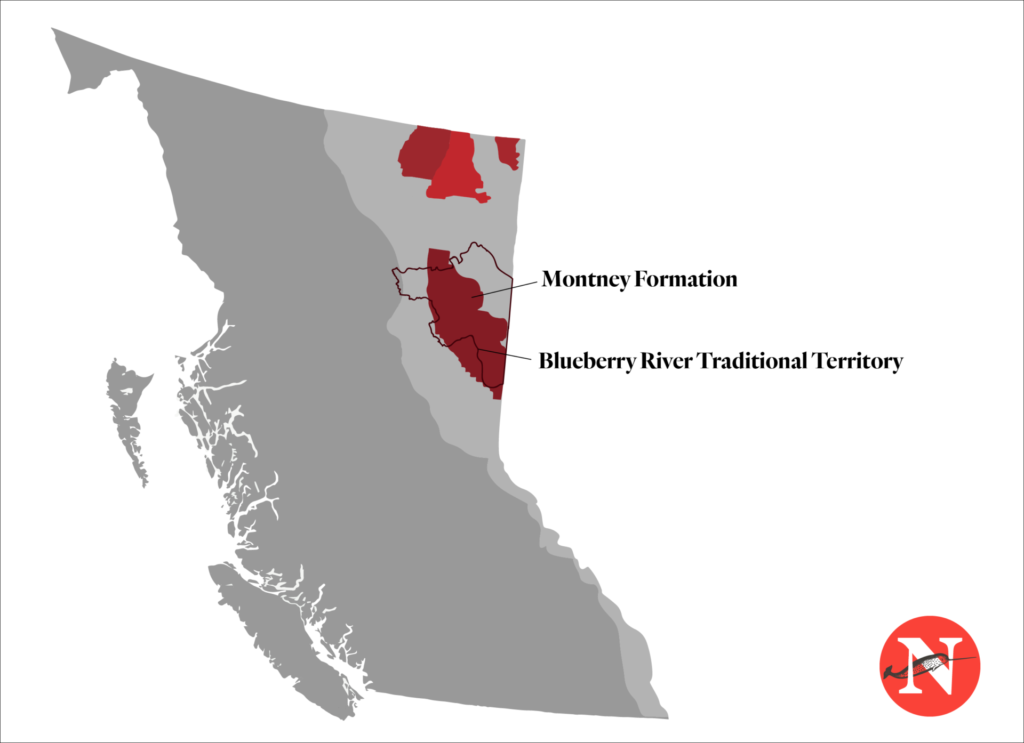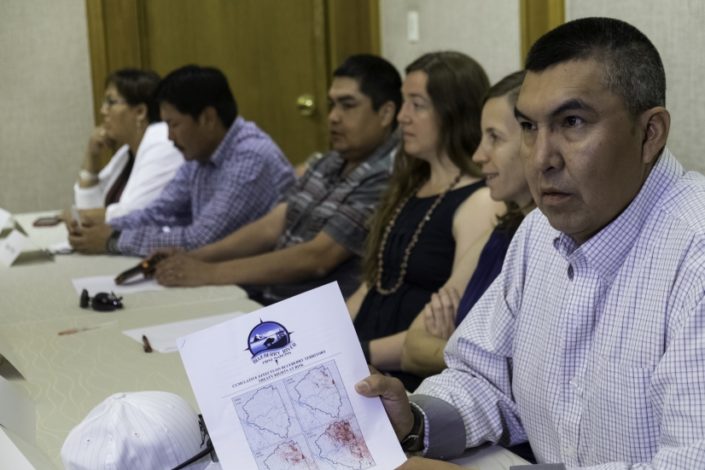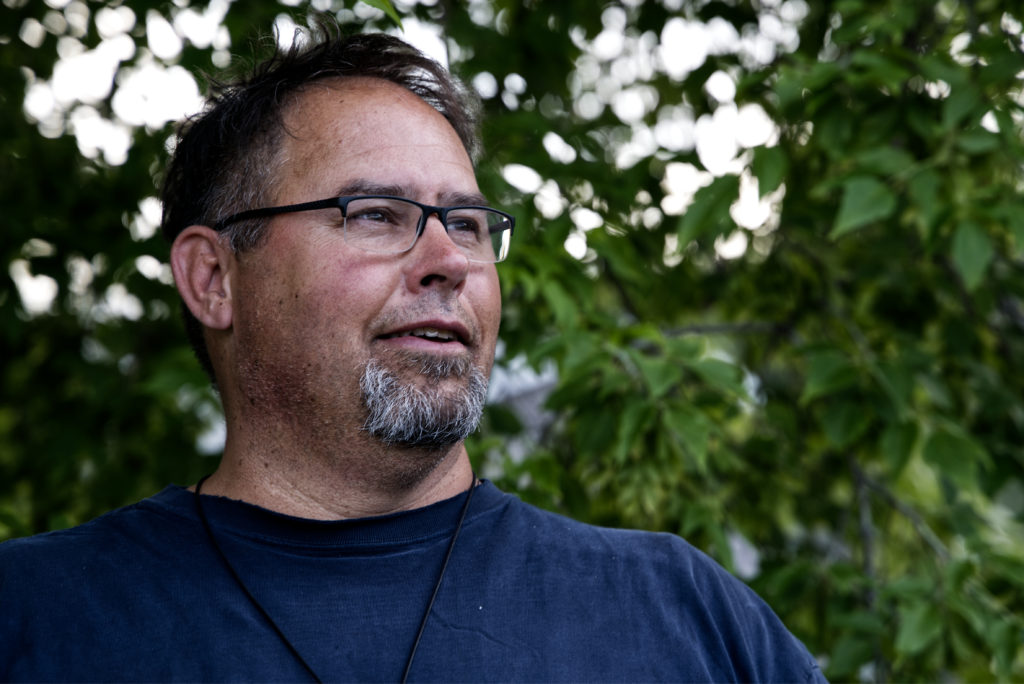
Celebrating 7 years of The Narwhal — and gearing up for the next 7
Between a fresh take on engagement and our new life on video, our team is...
The B.C. government breached the Treaty Rights of the Blueberry River First Nations, says a new provincial court ruling that could have sweeping implications for oil, gas, forestry and hydroelectric development in the northeastern part of the province.
In her ruling, B.C. Supreme Court Justice Emily Burke wrote “the province’s mechanisms for assessing and taking into account cumulative effects are lacking and have contributed to the breach of its obligations under Treaty 8.”
“The evidence shows that the province has not only been remiss in addressing cumulative effects and the impacts of development on treaty rights, but that it has been actively encouraging the aggressive development of the Blueberry Claim Area through specific royalty programs (including for marginal wells) and Jobs Plan policies,” the ruling states.
The province has taken up lands to such an extent that the Blueberry First Nations can no longer meaningfully exercise their Treaty Rights, according to the ruling.
“Blueberry’s knowledge and its ability to successfully hunt, trap, fish and gather depends on the health and relative stability of the environment. If forests are cut, or critical habitat destroyed, it is not as simple as finding another place to hunt. The Dane-zaa have located these places over generations,” the ruling reads.

Chief Marvin Yahey called it a historic day for his Nation.
“For years, Blueberry members have witnessed the destruction of our territory by provincial policies that actively support and promote industrial development at the expense of our way of life,” Yahey said.
“To get this confirmation from the Court after all the years we have been raising our concerns with the Crown is a very important recognition of our people, our culture and our way of life. Our elders and our young ones and all of us are very moved by this judgment, and now hopeful for the future.”
The justice ruled that the province must stop authorizing activities that breach the promises included in the Treaty, but noted she’s prepared to suspend this declaration for six months “while the parties expeditiously negotiate changes to the regulatory regime that recognize and respect Treaty Rights.”
Maegen Giltrow, legal counsel for Blueberry River First Nations, said the six-month clause is “a recognition that this is a whole-scale change” and that “the parties have got to start working diligently to find ways to honour the Treaty Rights. If it doesn’t happen within six months, the hard stop is there.”
The territory of the Blueberry River First Nations is impacted by forestry, oil and gas, agriculture, mining and hydroelectric development, including the Site C dam. By 2016, more than 110,000 linear kilometres of roads, pipelines and transmission and seismic lines had been cut across less than 40,000 square kilometres of land, according to an atlas of cumulative impacts. The same report found that 73 per cent of the Blueberry River First Nations’ traditional territory is within 250 metres of an industrial disturbance.
The Blueberry First Nations filed their case in March 2015. In 2018, the nation entered talks with the province to try to settle the case, but those talks failed. The court ruling this week awarded costs to Blueberry, which means the province will have to pay the nation’s court costs.
“Court costs don’t cover the actual costs of litigation,” Giltrow noted. “It won’t be a full 100 per cent compensation, not even close.”

Still, Giltrow said the ruling is a “complete vindication of Blueberry’s position.”
“The Crown really strongly believed that it had the right to take up land so long as it consulted. But the court noted that consultation never resulted in a no … It always resulted in approval,” Giltrow said. “The court found there’s a limit and it’s been passed.”
The ruling has “very big implications,” according to Giltrow. “The province can’t keep approving development until this issue is dealt with.”
West Moberly First Nations Chief Roland Willson called the decision an “amazing victory.”
“Hats off to Blueberry First Nations,” he told The Narwhal.
“I’m excited. All of these years of talking about the effects of cumulative impacts, it feels like a validation that the court finally said … ‘come up with a better solution for dealing with this stuff.’ And that’s what we’ve been saying.”

West Moberly First Nations has launched a landmark legal case against the Site C dam, arguing that the $16 billion hydro project and two previous dams on the Peace River constitute an unjustifiable infringement of Treaty rights. The case, which will be heard next March, could have major implications for the troubled Site C dam project.
Chief Willson said the Nation’s legal team is still poring over the Blueberry decision, which he said will bolster West Moberly’s case against the Site C project and other Peace River dams.
“I think this gives us a pretty big stick in the fight,” he said. “ On the face of it, Blueberry went to court over cumulative impacts from all the development in their territory. And when you look at the map they provided, their territory overlaps with our territory. Site C was in their court case … they did identify it as an impact.”
B.C.’s Ministry of Indigenous Relations and Reconciliation called the ruling “significant,” saying it will be “working to determine the province’s next steps once we’ve had a chance to review what the judge has said.”
“The written decision is long and complex but in light of the significant implications, we recognize the urgency,” the ministry said in an emailed statement. “This work is a priority, given the timeline established by the court.”
The ministry said it has always remained open to a collaborative dialogue with Blueberry River First Nations outside of the courts and will be reaching out to the Nation shortly regarding the court’s decision.
— With files from Sarah Cox
Get the inside scoop on The Narwhal’s environment and climate reporting by signing up for our free newsletter. On a warm September evening nearly 15...
Continue reading
Between a fresh take on engagement and our new life on video, our team is...

The public has a few days left to comment on Doug Ford’s omnibus development bill....

115 billion litres, 70 years to fix, $5.5 billion in lawsuits
